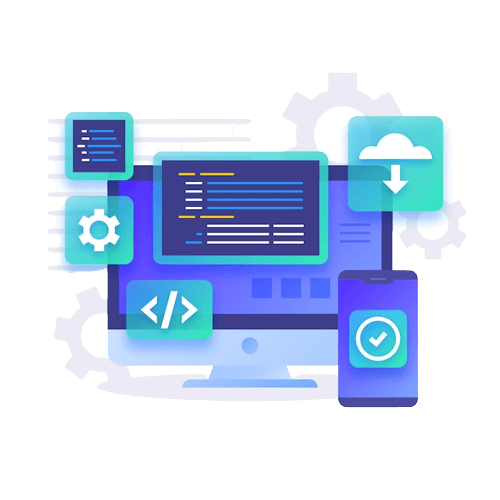In today’s dynamic business landscape, the retail and hospital industries face unique challenges that demand innovative solutions. To overcome these challenges, businesses are turning to customized software development. By crafting tailored software solutions, organizations in the retail and hospital sectors can streamline operations, enhance efficiency, and deliver exceptional customer experiences. In this comprehensive blog, we will explore the world of customized software development for the retail and hospital industries, highlighting its significance, benefits, and how it can drive success in these sectors.

I. Understanding Customized Software Development
A. Defining Customized Software:
- Retail and Hospital Industries: Exploring the specific needs and complexities that drive the demand for customized software solutions.
- Tailored Solutions: Discussing how customized software is designed to address industry-specific challenges and improve processes.
B. Key Components:
- Requirements Analysis: Highlighting the importance of a thorough assessment of business needs and workflows.
- Design and Development: Exploring the process of creating unique software solutions, considering usability, scalability, and integration.
- Testing and Deployment: Discussing the significance of comprehensive testing to ensure functionality, security, and user-friendliness.
- Support and Maintenance: Highlighting the ongoing support and maintenance services provided to ensure optimal software performance.
II. Customized Software Development for the Retail Industry
A. Inventory Management:
- Streamlining Stock Control: Exploring how customized software can automate inventory tracking, optimize stock levels, and prevent stockouts.
- Supply Chain Integration: Discussing the benefits of integrating customized software with suppliers and distributors for seamless order management.
B. Point of Sale (POS) Systems:
- Enhanced Customer Experience: Highlighting features like efficient checkout, personalized promotions, and loyalty programs.
- Sales and Analytics: Exploring how customized software enables real-time sales tracking, reporting, and data analysis.
C. E-commerce Integration:
- Online Store Management: Discussing the integration of customized software with e-commerce platforms to streamline online sales, inventory, and order processing.
- Customer Relationship Management (CRM): Exploring the benefits of CRM integration to manage customer data, improve customer service, and drive marketing initiatives.
III. Customized Software Development for the Hospital Industry
A. Electronic Health Records (EHR):
- Efficient Data Management: Discussing how customized software can streamline patient data entry, retrieval, and secure sharing across departments.
- Decision Support Systems: Exploring the benefits of integrating intelligent algorithms and data analytics for clinical decision-making.
B. Appointment and Scheduling:
- Patient Appointment Management: Highlighting features like online booking, automated reminders, and efficient scheduling for improved patient experience.
- Resource Optimization: Discussing how customized software can optimize staff schedules, room utilization, and equipment allocation.
C. Patient Billing and Insurance:
- Streamlined Billing Processes: Exploring how customized software can automate billing, insurance claims processing, and payment tracking.
- Revenue Cycle Management: Highlighting the benefits of customized software in managing the financial aspects of healthcare operations.
IV. Benefits of Customized Software Development
A. Tailored to Specific Needs:
- Process Optimization: Discussing how customized software aligns with unique workflows and business requirements.
- Scalability and Flexibility: Exploring the ability of customized software to adapt and grow with the organization’s changing needs.
B. Enhanced Efficiency and Productivity:
- Automation of Manual Tasks: Highlighting the benefits of reducing manual efforts, minimizing errors, and increasing operational efficiency.
- Seamless Integration: Discussing how customized software can integrate with existing systems, ensuring smooth information flow across departments.
C. Improved Decision-Making:
- Real-time Data Insights: Exploring how customized software provides accurate and timely information for informed decision-making.
- Analytics and Reporting: Highlighting the benefits of customized software in generating comprehensive reports and analytics to drive strategic planning.
V. Choosing the Right Customized Software Development Partner
A. Industry Expertise:
- Understanding Industry Challenges: Discussing the importance of partnering with a development team experienced in the retail and hospital sectors.
- Knowledge of Regulatory Compliance: Highlighting the significance of compliance with industry-specific regulations and standards.
B. Collaboration and Support:
- Communication and Project Management: Exploring the importance of effective collaboration and transparent project management.
- Ongoing Support and Maintenance: Discussing the need for post-development support, updates, and maintenance services.
Conclusion:
Customized software development offers tailored solutions for the retail and hospital industries, addressing their unique challenges and unlocking new possibilities for success. From inventory management and point of sale systems to electronic health records and patient appointment management, customized software enhances efficiency, streamlines processes, and empowers informed decision-making.

